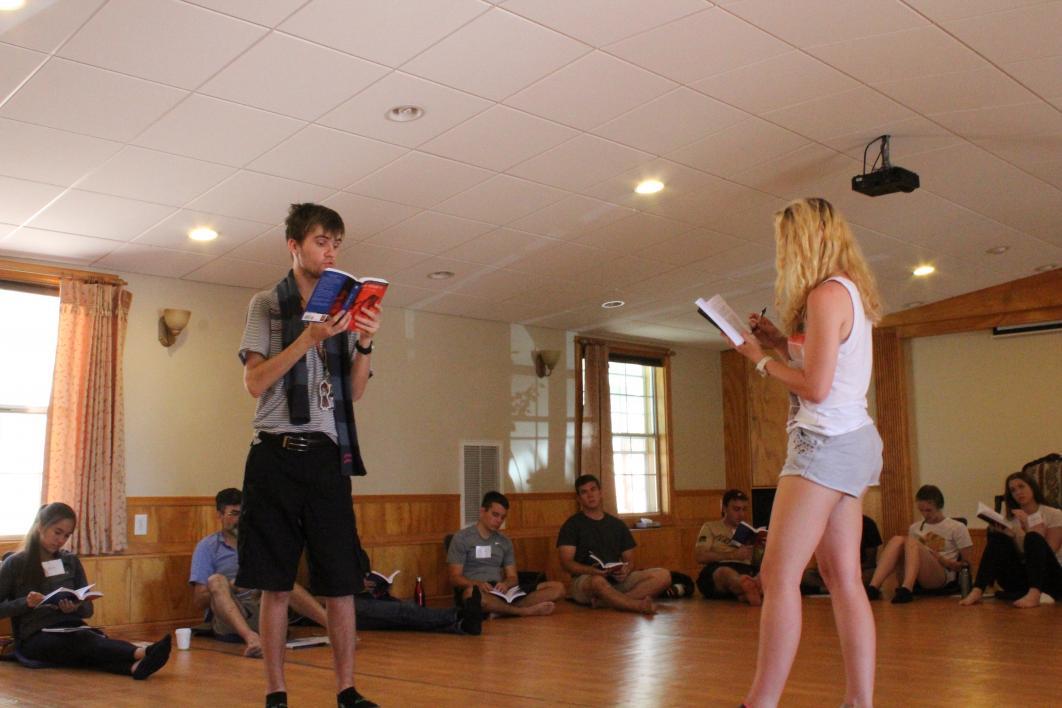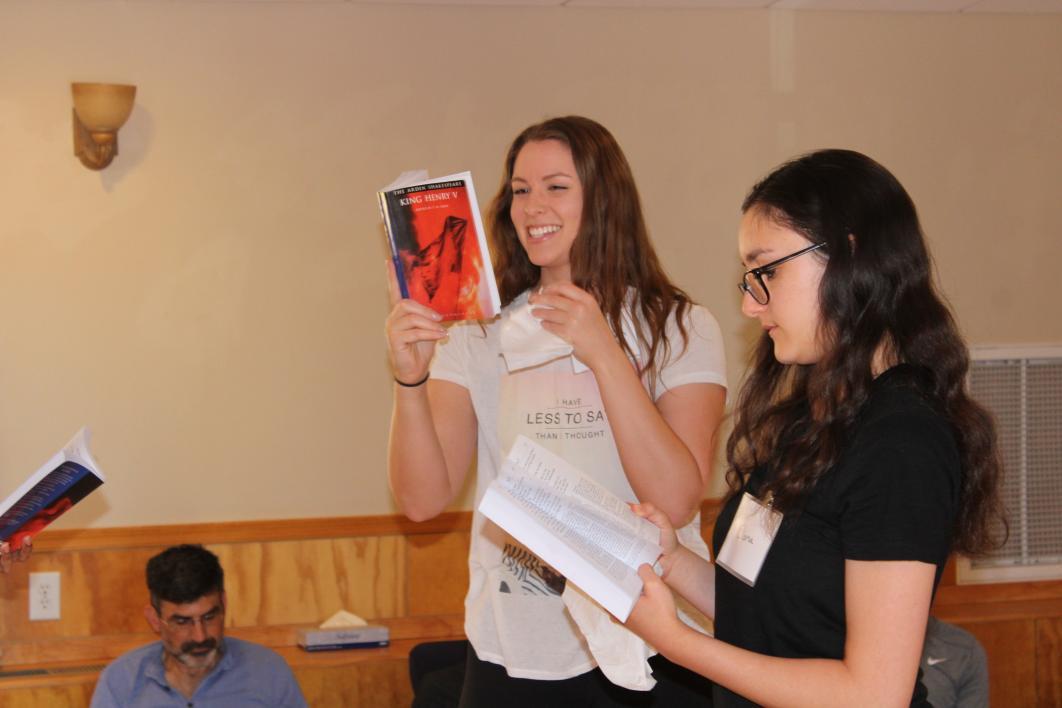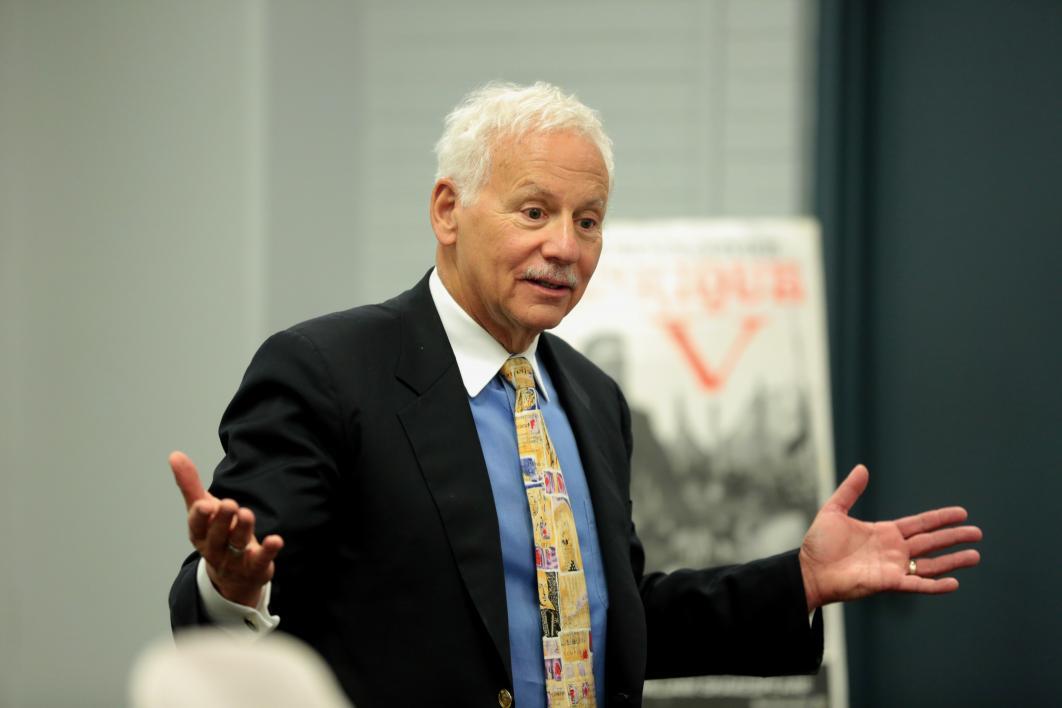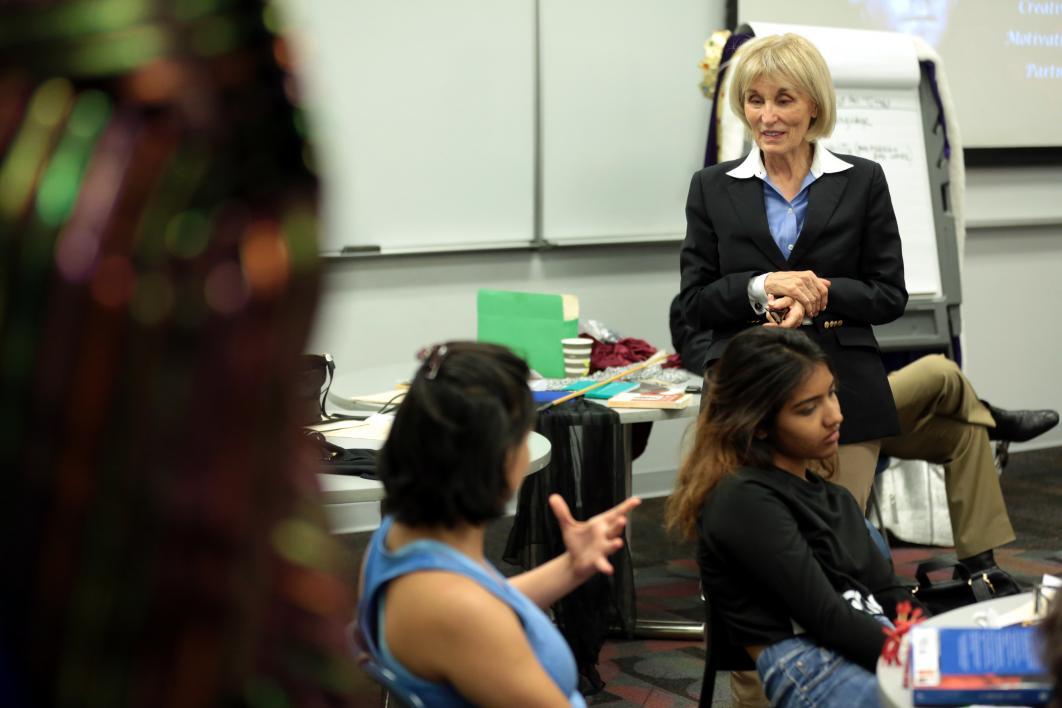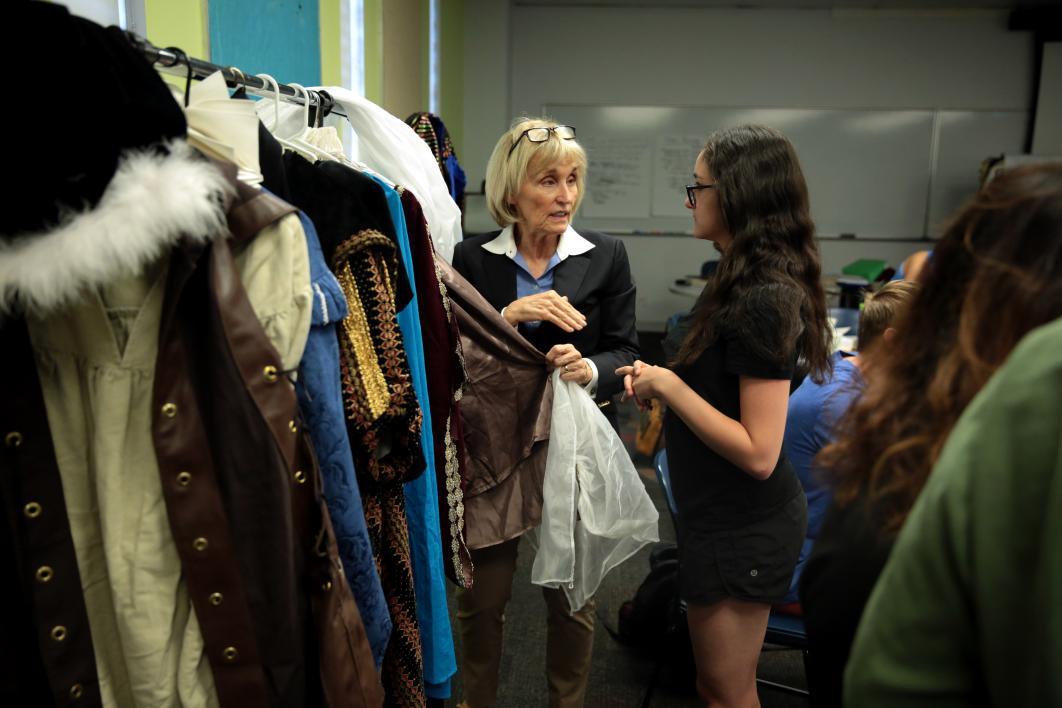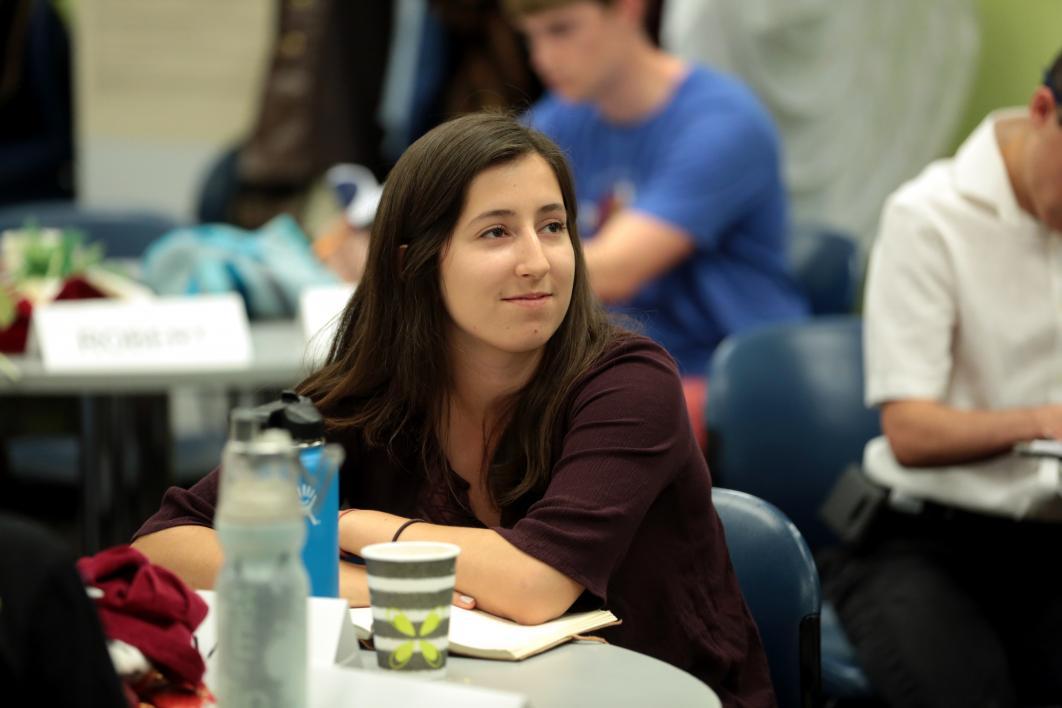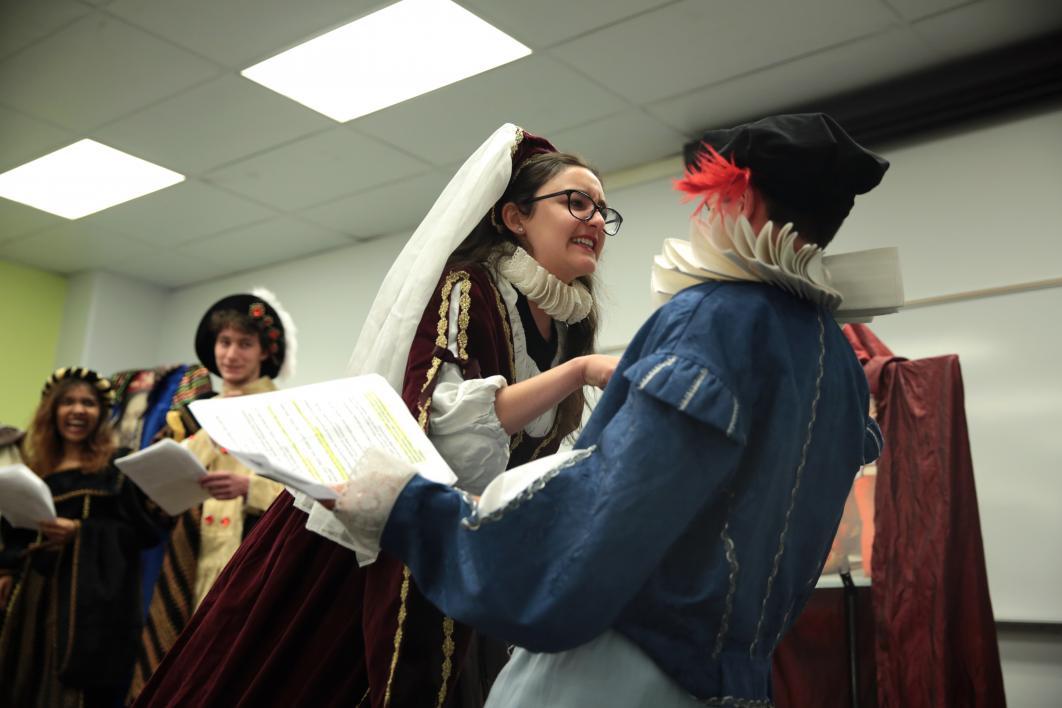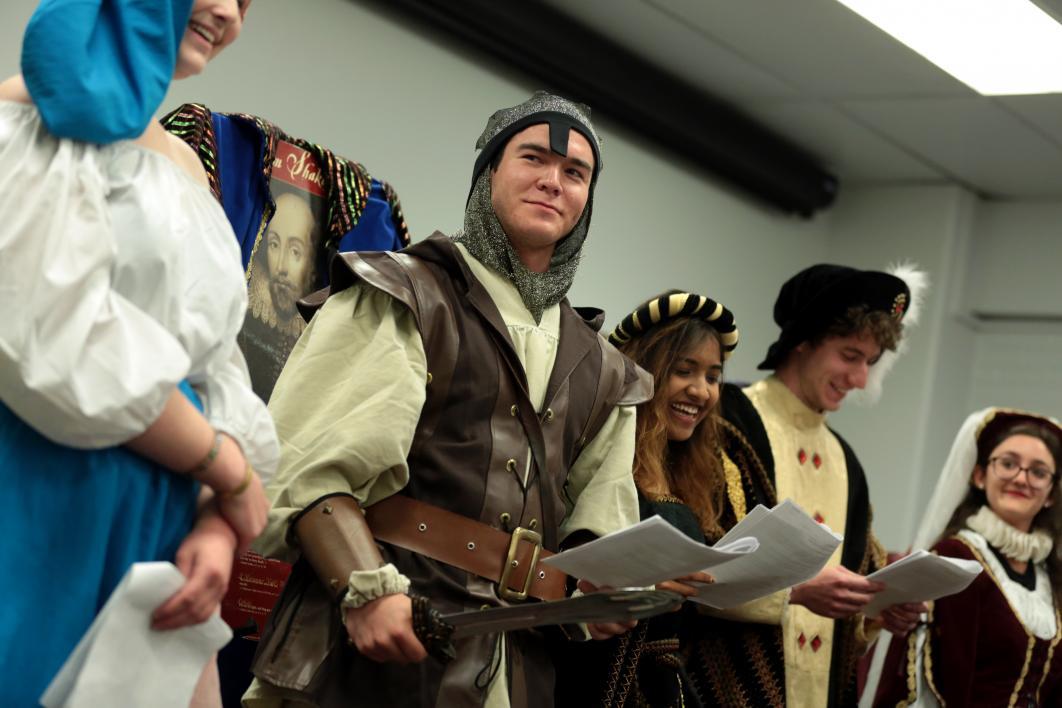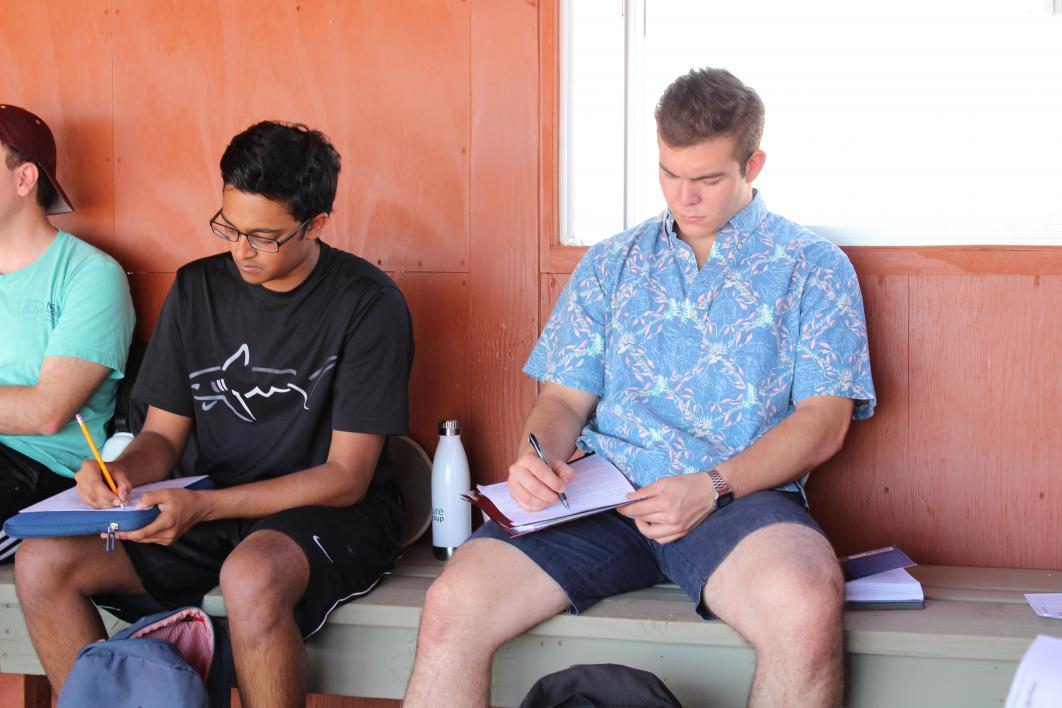ASU students apply lessons from Shakespeare to their own plans for leadership excellence
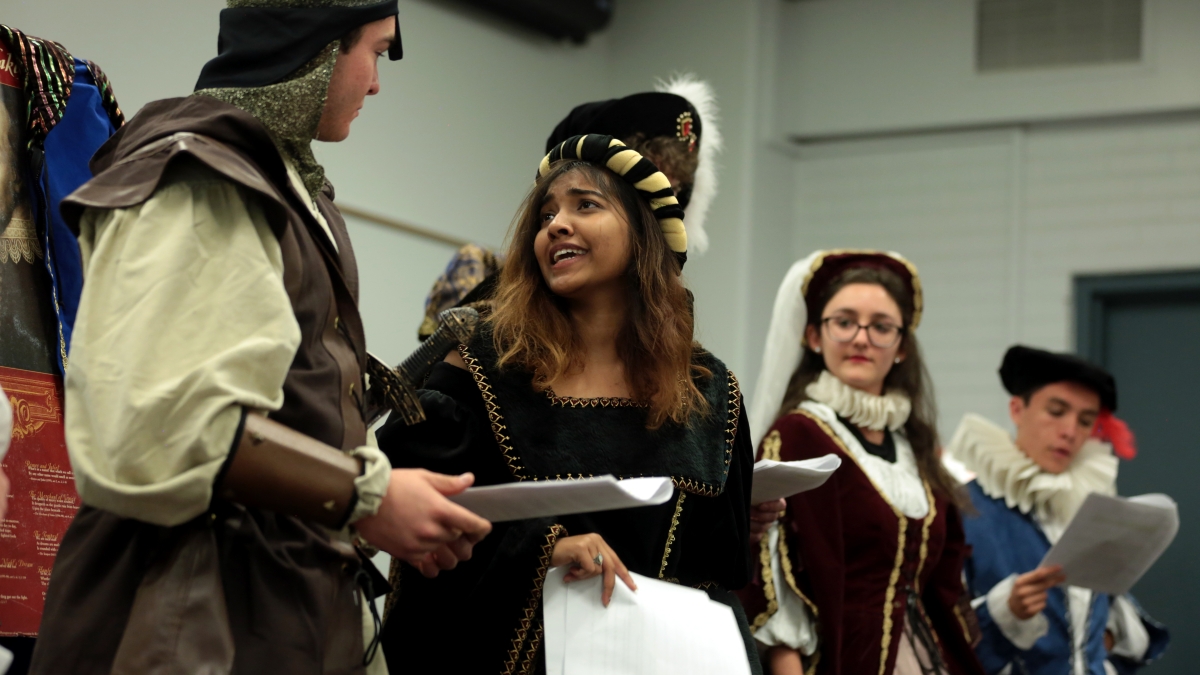
Students perform Shakespeare scenes as part of a leadership exercise. Photo courtesy Gage Skidmore
Just as the school year was ending for most Arizona State University students, the School of Civic and Economic Thought and Leadership began its first summer seminar — an intensive, three-credit residential experience for 27 ambitious students, including several TiIlman Scholars. The students devoted the first week of summer to honing their leadership skills, not through trust exercises or a formal training program, but through the close group study of two plays.
The Summer Leadership Seminar is designed to inform students' own approaches to leadership by examining classic works of great moral, political and economic thought. This year's theme was “Shakespeare’s Leadership Lessons,” and students in the weeklong program examined two very different constructions of leadership: the portraits of kings as portrayed by the lead characters — and the people who orbit them — in "Macbeth" and "Henry V."
Shakespeare and leadership?
Abraham Lincoln, an effective leader, commanding orator and devoted statesman, studied Shakespeare throughout his presidency. He was known to recite passages of "Macbeth" from memory to military leaders and lawmakers during some of the most harrowing moments of the Civil War. So it seems fitting that the summer seminar would begin with an essay examining the Bard's profound influence on Lincoln's presidency, including references throughout some of his most famous public addresses.
Lincoln might seem an unexpected fan of The Scottish Play, which tells the story of a king so distorted by blind ambition that, although he reaches his zenith of influence, he lacks noble purpose and his reign devolves into tyranny before ending in disaster.
School of Civic and Economic Thought and Leadership Director Paul Carrese explained, “Lincoln found insights about war and peace and the ethical dilemmas of his high office; and it’s likely that he sought to test himself against the dark portrait of ambition and power that Shakespeare offers of the Scottish leader Macbeth — who at the beginning of the play is an honorable and even noble figure, but quickly turns to murder, deception, and destruction.”
"Henry V," the focus of the second half of the course, presented the Summer Leadership Seminar students with a foil to Macbeth's cautionary tale of ambition run amok. "Henry V" recounts the accomplishments of an exceptional king — one concerned with egalitarianism, human decency and diplomacy.
Known as a heroic general, innovative military strategist and humble statesman, Henry's is a portrait of a king who artfully exchanges his party-animal reputation for the universal respect of his kingdom. Thrust into war amid mounting disadvantages against the well-armed and heavily favored French army, King Henry achieves his pinnacle of power when he inspires troops to fight for glory in the legendary "St. Crispin's Day Speech." The speech, which has since been repeated everywhere from Charles Dickens' weekly magazine to "Buffy the Vampire Slayer," is probably most memorable as a radio speech made by Laurence Olivier to boost British morale during World War II — a moment so inspiring to the nation that Winston Churchill later requested Olivier turn the play into a film.
Leadership students immerse themselves in a week of study, reflection and debate
On the first official day of the Summer Leadership Seminar, the students boarded a bus and headed to the Mago Retreat Center, a Tao nonprofit residence in a remote area outside of Sedona. The group — with majors ranging from biochemistry to English literature — contemplated and debated how ambition, noble or otherwise, affects leadership styles, shapes public perception, and alters businesses, communities and society. The students anchored their arguments by performing and interpreting scenes from "Macbeth."
Susan Carrese, experiential education coordinator for the School of Civic and Economic Thought and Leadership, designed the highly interactive syllabus.
Having taught similar courses at the National University of Lesotho, Colorado College and the U.S. Air Force Academy, Susan Carrese and Paul Carrese predicted that the Summer Leadership Seminar would be an ideal pedagogical fit for students because it echoes the experiential learning model central to the school’s curriculum.
“The goal of this experiential course was to offer students a unique encounter with Shakespeare — beyond a darkened theater, an English class, or the dreaded 'required' reading,” said Susan Carrese. “This immersion made the texts and our intellectual community come alive for our 27 students.”
Ashley Peake, a junior majoring in biochemistry, noted that studying, living and dining together for a full week enriched the learning experience.
“It’s not like at the end of class you’re done and it’s over," she said. "It’s something that we’re there experiencing. We’re not just there to get a lecture or have a quick discussion and leave. The conversation keeps going and I feel like that’s how we should look at education in general, as something that continues beyond the classroom.”
“I’ve become more comfortable sharing and presenting in a large group," said Jack Longo, a junior double-majoring in English literature and economics. "Throughout the week, getting to know people improved the classroom experience and facilitated discussions. I found myself branching out and talking to new people over meals.”
Applying Shakespeare's leadership lessons to business and government
By the time the students returned to the Tempe campus, they were well-versed in the plots and themes of the two plays, had considered leadership from multiple perspectives and were ready to delve into the next layer of their experience: two days of study, activity and debate with Carol Adelman and Ambassador Ken Adelman, of executive coaching team Movers & Shakespeares.
Over the last 20 years, the Adelmans have used their unique experience working in high offices of the U.S. government — in both domestic and foreign affairs — paired with intensive study of Shakespeare, to coach a client roster that includes the Wharton School of Business, the Center for Public Leadership at Harvard's JFK School of Government, AT&T and Lockheed Martin.
According to Paul Carrese, the Adelmans’ program is effective because their government experience, paired with leadership expertise, contextualizes Shakespeare within real-life scenarios.
“They shared their view that Shakespeare’s insights make sense of important leaders and situations they encountered in public service and can offer important lessons to ambitious young people today.”
The Adelmans two-day curriculum highlighted important leadership themes by moving between film versions and text to focus on four distinct parts of "Henry V":
1. Henry's meeting with the Archbishop of Canterbury, in which he seeks to legitimize his mission to reclaim France by gaining support from the church. The stakeholder consensus King Henry seeks, according to Ken Adelman, is imperative for making big decisions in contemporary business and politics.
2. Henry's choice to punish his friend and drinking buddy, Bardolph, when he’s caught stealing a pewter chalice from a French church. By defying the King’s orders not to pillage, at the risk of punishment by hanging, Bardolph tests Henry’s resolve as disciplinarian.
3. Henry's wooing of Katharine, in which he convinces the deposed princess to marry him and elevate herself to queen of England and France. According to the Adelmans, it’s not just Henry’s artful communication that wins Katharine over — though those skills are important for leaders to master. It is also the fact that he appeals to her own sense of ambition by offering her upward mobility, or, career advancement.
4. The battle at Agincourt, wherein Henry leads his troops to victory — he loses hundreds of soldiers where the French army loses thousands — in spite of inadequate armor, impoverished troop numbers and unfamiliar terrain. Henry's strength as a general lies in his innovative military strategy. More important, though, is the St. Crispin's Day speech, in which he calls upon his "band of brothers" to join him in a war for glory that will make their names "household words." He ignites them, through camaraderie and a shared, noble purpose, to see the fight as an elite privelege and honor befitting only the best and bravest men in England. His rhetorical work here not only rouses his troops to battle, but convinces them they are legends in the making, a leadership strategy that unites contemporary employees and constituents just as successfully as it does medieval troops.
These points speak to human nature, which Shakespeare seems to get very right, time and time again.
Why Shakespeare now?
Even if someone has never read a Shakespeare play or sonnet, chances are they've encountered the influence of the Bard. Maybe they've seen "West Side Story" or "Strange Brew" or "Ten Things I Hate About You." Maybe they’ve uttered the phrase “kill ‘em with kindness,” or have told a knock-knock joke ("Knock knock!" "Who’s there?" is a line from "Macbeth.")
To say that Shakespeare has had a lasting impression on contemporary Western culture would be an understatement.
But according to Paul Carrese, his insights about people are as important as his contributions to the lexicon: “Theories of leadership come and go, but if there are some constants to human nature and the institutions or associations we build, then Shakespeare's plays offer us a range of characters and scenarios, from villains to heroes, democrats to tyrants, peace to war.”
By the last day of the seminar, students were debating major leadership themes with confidence, deftly referencing poignant scenes from the plays to support their arguments about justice, motivation, honor and innovation.
Neil Ramesh, a sophomore majoring in economics, found the experience useful.
"My major is more quantitative, rather than thinking about deeper issues, so that’s been especially interesting," he said. "Reading into Shakespeare is something I wouldn’t regularly do. Even learning from the negative things that King Henry did is helpful."
The Adelmans' approach combines study of the text as written, and then as performed, noting that Shakespeare's ambiguity — whether intentional or not — complicates the narrative and allows for multiple, sometimes diametrically opposite interpretations.
When asked whether Shakespeare intended for his plays to be molded and reimagined over time to fit present day circumstances, or if they should be approached as stable works with universal truths that stand the test of time, the class conversation shifted to other important texts left to interpretation, namely, the U.S. Constitution.
Student participant Cameron Vega proposed an originalist approach to Shakespeare, in which the work should be considered the same as it would have when it was written. He quoted Justice Antonin Scalia’s judicial philosophy in Supreme Court Cases as support for his argument.
Jack Longo, considering Vega's statement, commented, "I don't often find myself on the same side as Scalia, but in this case, I'd have to agree."
Asha Ramakumar, a sophomore majoring in business and global politics, said it is this kind of thoughtful consideration of opposing viewpoints that made the exercises from the Summer Leadership Seminar on Shakespeare valuable when thinking about governance.
"I think it's incredibly important because too often there are jaded opinions about politics at the university level," Ramakumar said. "I would like to see more diverse people with more diverse opinions come together to bridge the partisan nature of modern politics."
More Law, journalism and politics
Can elections results be counted quickly yet reliably?
Election results that are released as quickly as the public demands but are reliable enough to earn wide acceptance may not…
Spring break trip to Hawaiʻi provides insight into Indigenous law
A group of Arizona State University law students spent a week in Hawaiʻi for spring break. And while they did take in some of the…

LA journalists and officials gather to connect and salute fire coverage
Recognition of Los Angeles-area media coverage of the region’s January wildfires was the primary message as hundreds gathered at…


